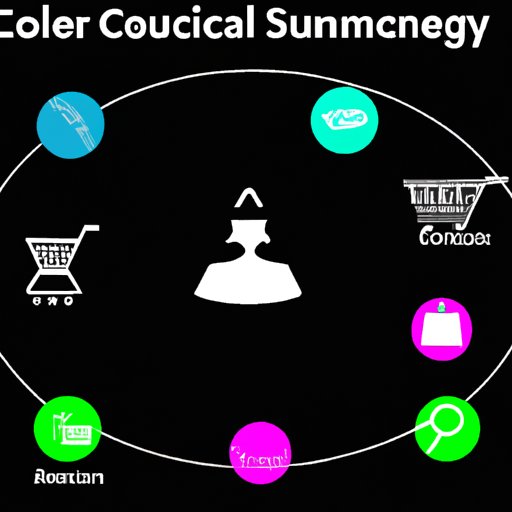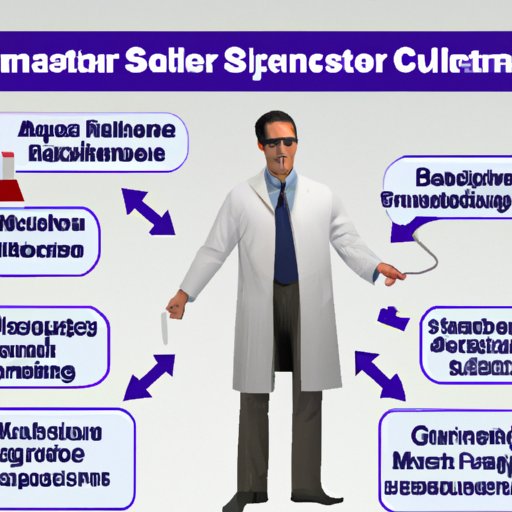Exploring the Basics of Consumer Science
Consumer science is an interdisciplinary field that seeks to understand how consumers make decisions regarding their purchases of goods and services. It combines elements from psychology, sociology, economics, marketing, and other disciplines to gain a more comprehensive understanding of consumer behavior. By studying consumer science, businesses can better understand their customers and develop effective strategies for marketing and selling their products.
Definition of Consumer Science
Consumer science is defined as “the study of how people acquire, use, and dispose of goods and services” by the American Council on Consumer Interests (ACCI). This definition encompasses the entire process of consumption, including how people select, purchase, use, and dispose of goods and services. The ACCI notes that consumer science also takes into account the psychological, social, economic, and environmental factors that influence consumer decisions.
History of Consumer Science
The field of consumer science has its roots in the early 20th century. During this time, many countries began to recognize the need to protect consumers from predatory businesses and unfair practices. Consumer protection laws were developed to ensure that consumers had access to safe and quality goods and services. In response, universities began to offer courses in consumer education, which laid the foundation for what is now known as consumer science.
Different Types of Consumer Science
Consumer science is divided into two main branches: consumer studies and consumer economics. Consumer studies focuses on the psychological aspects of consumer behavior, such as motivation, attitudes, and decision-making processes. It examines how cultural, social, and psychological factors influence consumer choices. Consumer economics, on the other hand, looks at the economic aspects of consumer behavior. It investigates how economic principles, such as supply and demand, affect consumer decisions.

The Role of Consumer Science in the Modern World
Consumer science plays an important role in today’s society. Businesses rely on consumer science to understand their customers and design effective marketing strategies. Governments use consumer science to develop consumer protection policies and regulations. Consumers, meanwhile, benefit from consumer science through increased access to quality products and services.
How Consumer Science Affects Businesses and Consumers
Consumer science helps businesses identify customer needs and preferences. By studying consumer behavior, businesses can develop marketing campaigns that target specific audiences. They can also use consumer science to determine the best pricing strategies for their products and services. On the other hand, consumers benefit from consumer science because it provides them with information about products and services, allowing them to make informed decisions.
The Impact of Technology on Consumer Science
Technology has had a significant impact on consumer science. With the rise of the internet and social media, businesses have been able to gather vast amounts of data about their customers. This data can be used to create targeted marketing campaigns and personalize product offerings. Additionally, technology has allowed businesses to track consumer behavior in real time, giving them insight into customer habits and preferences.
What Does a Consumer Scientist Do?
A consumer scientist is responsible for researching and analyzing consumer behavior. They use data and research methods to develop insights into consumer preferences, motivations, and decision-making processes. Consumer scientists are also involved in developing marketing strategies and assessing the effectiveness of advertising campaigns.
Job Description
A consumer scientist typically works in a research or marketing department. Their job duties may include conducting surveys and focus groups, analyzing data, writing reports, and providing recommendations to management. They may also be responsible for designing and implementing experiments to evaluate the effectiveness of marketing campaigns.
Education Requirements
Most consumer scientists hold a bachelor’s degree in a related field, such as psychology, sociology, anthropology, or economics. Some employers may require a master’s degree or other advanced qualifications. Additionally, many consumer scientists have specialized knowledge in areas such as market research, data analysis, and consumer behavior.

How to Become a Consumer Scientist
Becoming a consumer scientist requires dedication and hard work. Here are some steps to become a consumer scientist:
Steps to Becoming a Consumer Scientist
1. Obtain a bachelor’s degree in a related field, such as psychology, sociology, anthropology, or economics.
2. Gain experience in related fields, such as market research, data analysis, and consumer behavior.
3. Develop strong communication and problem-solving skills.
4. Pursue advanced qualifications, such as a master’s degree or professional certifications.
5. Network with professionals in the field to gain insight and advice.
Professional Organizations and Certifications
There are several professional organizations and certifications available to help aspiring consumer scientists. The American Council on Consumer Interests offers a Certified Professional in Consumer Studies program, which provides training in consumer education, research, and policy. The Association for Consumer Research also offers professional certifications and educational resources. Additionally, the International Society for Quality-of-Life Studies offers a certification program for researchers in the field of consumer science.

The Benefits of Studying Consumer Science
Studying consumer science can provide numerous benefits for students. It can give them a better understanding of consumers’ needs and behaviors, as well as an appreciation for the social, cultural, and economic forces that shape consumer decisions. Additionally, studying consumer science can help students develop critical thinking and problem-solving skills, which can be beneficial in any profession.
Understanding Consumers’ Needs and Behaviors
By studying consumer science, students can gain a deeper understanding of consumer behavior. They can learn about the psychological, social, and economic factors that influence consumer decisions. This knowledge can help them develop effective marketing strategies and design products and services that meet consumers’ needs.
Enhancing Problem Solving Skills
Consumer science also teaches students how to think critically and solve problems. They learn how to analyze data and develop strategies to address consumer issues. This skill can be useful in many different professions, such as business, marketing, and sales.
Applications of Consumer Science
Consumer science has many practical applications. Here are some of the most common:
Market Research
Market research is the process of gathering and analyzing data about consumer behavior. Consumer scientists use market research to gain insights into consumer preferences and develop effective marketing strategies. They may also use market research to assess the potential success of new products and services.
Product Testing
Product testing is the practice of evaluating products before they are released to the public. Consumer scientists use product testing to assess the safety, quality, and performance of products. This helps manufacturers ensure that their products meet consumers’ expectations and comply with industry standards.
Consumer Advocacy
Consumer advocacy is the practice of advocating for the rights of consumers. Consumer scientists can help educate consumers about their rights and assist them in filing complaints against companies that violate consumer protection laws. They can also work with government agencies to develop consumer protection policies and regulations.
Trends in Consumer Science Research
Consumer science is constantly evolving as new technologies and research methods emerge. Here are some of the current trends in consumer science research:
New Technologies
Advances in technology have enabled consumer scientists to gather large amounts of data about consumer behavior. This data can be used to develop more accurate models of consumer behavior and create more effective marketing strategies. Additionally, technology has allowed consumer scientists to track consumer behavior in real time.
Data Collection and Analysis
Data collection and analysis are essential components of consumer science research. Consumer scientists use data to develop insights into consumer preferences and decision-making processes. They also use data to evaluate the effectiveness of marketing campaigns and develop strategies for targeting specific audiences.
Developing Strategies for Sustainable Consumption
Consumer scientists are increasingly focusing on developing strategies for sustainable consumption. They are researching ways to reduce waste and encourage environmentally friendly purchasing habits. This research can help businesses create more sustainable products and services, as well as develop effective strategies for promoting sustainable consumption.
Conclusion
Consumer science is an interdisciplinary field that seeks to understand how consumers make decisions regarding their purchases of goods and services. It combines elements from psychology, sociology, economics, marketing, and other disciplines to gain a more comprehensive understanding of consumer behavior. Consumer science plays an important role in today’s society, helping businesses understand their customers and governments develop consumer protection policies. Studying consumer science can also provide students with valuable insights into consumer behavior and enhance their problem-solving skills. Finally, consumer science has many practical applications, such as market research, product testing, and consumer advocacy.
(Note: Is this article not meeting your expectations? Do you have knowledge or insights to share? Unlock new opportunities and expand your reach by joining our authors team. Click Registration to join us and share your expertise with our readers.)
